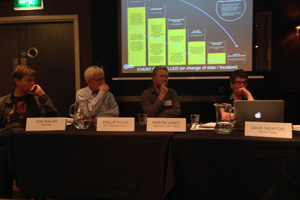
As part of the AIF's Seminars event on festival financials, which took place yesterday (12 November) at London's Minster Exchange, the industry discussed how festival organisers can manage cashflow before and after events.
The panel included Jonathan Walsh of Shambala Festival in Market Harborough, Northamptonshire; Philip Wicks from End of the Road Festival in north Dorset; Hebriddean Celtic Festival’s Martin Jones; and Dave Newton of We Got Tickets.
Walsh of Shambala Festival said there has been a big shift in the last five years on deposits organisers are expected to pay suppliers ahead of an event as the festival market has mushroomed in size.
"Bigger suppliers will say no unless they receive larger deposits, but you have to stick to your guns," Walsh said. "Pay for the service and cover their costs, but it is unfair for suppliers to ask festival organisers for a deposit 80% or higher unless the work involved is particularly labour intensive."
Wicks said a 50% deposit is accepted throughout the industry and to push for lower is more difficult.
He added festival organisers should stand their ground on deposit payments: "There are a lot of suppliers who expect a 100% deposit, but you have to say no. It is often agents rather than artists who ask for all the money upfront but you have to resist that – it is an exploitation of the artists before they have even performed."
Jones from the Hebriddean Celtic Festival said to key is building a good relationship with suppliers to agree a fair level of deposit between both parties.
Walsh said his team had always sold the event as an experience rather than relying on headline acts who may come with hefty financial demands. "We had complaints from customers that we weren’t selling the music line-up enough. However, we feature a wide array of up-and-coming artists and we are not looking for headline acts – this gives us a better footing to secure deals with suppliers rather than negotiating."
When asked how they would support their own events should cashflow take a hit, owing to event cancellations and paying suppliers and refunding customers, Jones said you should build up reserves to compensate for this scenario.
"We set aside 10-15% of turnover for any problems that may arise in the future," he said.
Wicks revealed End of the Road Festival uses the TOMS (Tour Operators Margin Scheme) VAT system, which means the company does not have to pay tax on tickets until after the event. "This means we don’t have to part with half a million pounds worth of funds before the festival has begun," he said.
Comment below to let us know what you think.
For more in-depth and print-only features, showcases and interviews with world-leading brands, don't miss the next issue of Event magazine .

